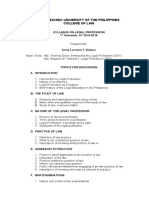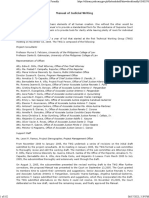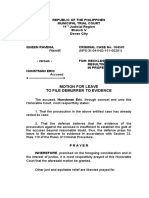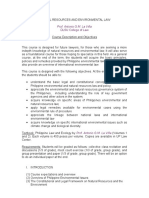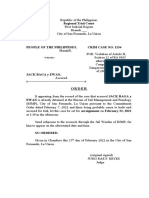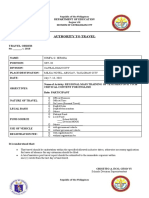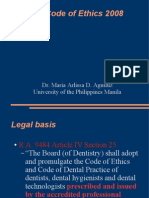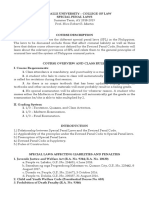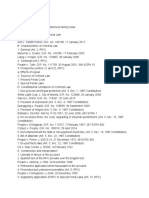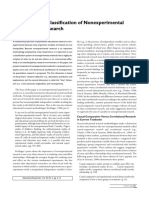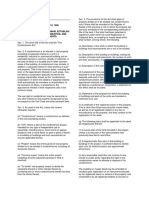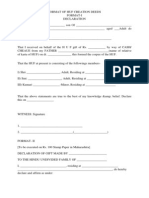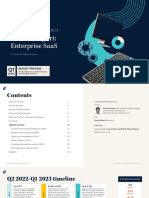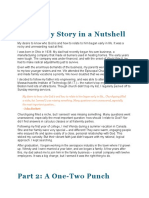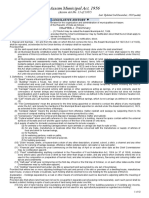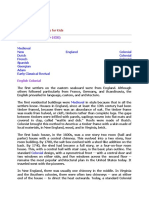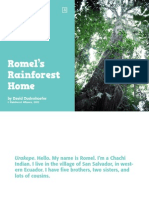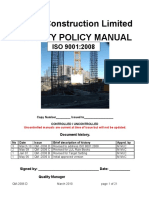0 ratings0% found this document useful (0 votes)
188 viewsCriminal Law I Syllabus
Criminal Law I Syllabus
Uploaded by
CMLThis document outlines the topics to be covered in the Criminal Law I course. It includes a discussion of the nature and definition of criminal law, the characteristics of criminal law including its general, territorial and prospective application. It also addresses the sources of criminal law including the Revised Penal Code and special penal laws. Additionally, it examines the constitutional limitations on criminal law relating to due process, equal protection, freedom of expression, freedom of religion, prohibitions on excessive fines and cruel punishment. Finally, it discusses the construction and interpretation of criminal law including liberal construction in favor of the accused and retroactive application when favorable.
Copyright:
© All Rights Reserved
Available Formats
Download as DOCX, PDF, TXT or read online from Scribd
Criminal Law I Syllabus
Criminal Law I Syllabus
Uploaded by
CML0 ratings0% found this document useful (0 votes)
188 views1 pageThis document outlines the topics to be covered in the Criminal Law I course. It includes a discussion of the nature and definition of criminal law, the characteristics of criminal law including its general, territorial and prospective application. It also addresses the sources of criminal law including the Revised Penal Code and special penal laws. Additionally, it examines the constitutional limitations on criminal law relating to due process, equal protection, freedom of expression, freedom of religion, prohibitions on excessive fines and cruel punishment. Finally, it discusses the construction and interpretation of criminal law including liberal construction in favor of the accused and retroactive application when favorable.
Original Description:
Criminal Law i Syllabus
Original Title
Criminal Law i Syllabus
Copyright
© © All Rights Reserved
Available Formats
DOCX, PDF, TXT or read online from Scribd
Share this document
Did you find this document useful?
Is this content inappropriate?
This document outlines the topics to be covered in the Criminal Law I course. It includes a discussion of the nature and definition of criminal law, the characteristics of criminal law including its general, territorial and prospective application. It also addresses the sources of criminal law including the Revised Penal Code and special penal laws. Additionally, it examines the constitutional limitations on criminal law relating to due process, equal protection, freedom of expression, freedom of religion, prohibitions on excessive fines and cruel punishment. Finally, it discusses the construction and interpretation of criminal law including liberal construction in favor of the accused and retroactive application when favorable.
Copyright:
© All Rights Reserved
Available Formats
Download as DOCX, PDF, TXT or read online from Scribd
Download as docx, pdf, or txt
0 ratings0% found this document useful (0 votes)
188 views1 pageCriminal Law I Syllabus
Criminal Law I Syllabus
Uploaded by
CMLThis document outlines the topics to be covered in the Criminal Law I course. It includes a discussion of the nature and definition of criminal law, the characteristics of criminal law including its general, territorial and prospective application. It also addresses the sources of criminal law including the Revised Penal Code and special penal laws. Additionally, it examines the constitutional limitations on criminal law relating to due process, equal protection, freedom of expression, freedom of religion, prohibitions on excessive fines and cruel punishment. Finally, it discusses the construction and interpretation of criminal law including liberal construction in favor of the accused and retroactive application when favorable.
Copyright:
© All Rights Reserved
Available Formats
Download as DOCX, PDF, TXT or read online from Scribd
Download as docx, pdf, or txt
You are on page 1of 1
CRIMINAL LAW I
Prescribed text book/s:
1. Revised Penal Code Book I by Luis B. Reyes and/or
2. Commentaries on Criminal Law by Atty. Maximo P. Amurao Jr.
NB: Closed book policy shall be observed during class. Only handwritten notes will be allowed.
I. General Principles of Criminal Law
A. Nature and definition
People v. Genosa, G.R. No. 135981, 29 September 2000, 341 SCRA 493
B. Characteristics of Criminal Law
1. General (Art. 2, RPC)
Minucher v. Scalzo, G.R. No. 142396, 11 February 2003
Liang v. People, G.R. No. 125865, 28 January 2000
2. Territorial (Art.2, RPC)
People v. Tulin, G.R. No. 111709, 30 August 2001, 364 SCRA 10
3. Prospective (Article 21 and 22, RPC)
a. Effects of repeal
C. Sources of Criminal Law
1. Revised Penal Code
2. Special Penal Laws
D. Constitutional Limitations on Criminal Law
1. Due process and Equal protection (Art. 3, Sec. 1, 1987 Constitution)
White Light Corp. v. City of Manila, G.R. No. 122846, 20 January 2009
Garcia v. Drilon, G.R. No. 179267, 25 June 2013
2. Freedom of expression (Art. 3, Sec. 4, 1987 Constitution)
Guingguing v. People, G.R. No. 128959, 30 September 2005.
3. Freedom of religion (Art. 3, Sec. 5, 1987 Constitution)
Estrada v. Escritor, AM No. P-02-1651, 22 June 2006, 492 SCRA 1
4. No excessive fines, nor cruel, degrading or inhuman punishment. (Art. 3, Sec. 19, 1987
Constitution)
People v. Echagaray, G.R. No. 117472, 7 February 1997, 267 SCRA 682
Corpuz v. People, G.R. No. 180016, 29 April 2014
5. Non-imprisonment for debt or non-payment of poll tax ( Art. 3, Sec. 19, 1987 Constitution)
6. Bill of attainder (Art. 3, Sec. 22, 1987 Constitution)
People v. Ferrer, L-32613-14, 27 December 1972, 48 SCRA 382
7. Ex-post facto laws (Art. 3, Sec. 22, 1987 Constitution)
US v. Diaz Conde, L-18208, 14 February 1922
E. Construction and interpretation
1. Liberally in favour of the accused
2. Spanish text of the RPC prevails over the English text
People v. Abilong, L-1960, 26 November 1948.
3. Retroactive application when favourable to the accused
4. Prescribed but undeserved penalties (Art. 5, RPC)
People v. Formigones, L-3246, 29 November 1950
You might also like
- Celeb 001 PDF LoveDocument1 pageCeleb 001 PDF Lovevf44mk555n100% (6)
- Criminal Law Review-2020 Part 2 SyllabusDocument11 pagesCriminal Law Review-2020 Part 2 Syllabusrgtan3No ratings yet
- Notice of OrderDocument2 pagesNotice of OrderColleen Rose GuanteroNo ratings yet
- Polytechnic University of The Philippines College of LawDocument2 pagesPolytechnic University of The Philippines College of LawAnne Lorraine Diokno100% (1)
- CAPORASO, James, 1989, The Elusive State, London, SageDocument143 pagesCAPORASO, James, 1989, The Elusive State, London, SagejorgekmpoxNo ratings yet
- Dying DailyDocument3 pagesDying DailyAnonymous AHIfjTqLFlNo ratings yet
- Be It Enacted by The Senate and House of Representatives of The Philippines in Congress AssembledDocument7 pagesBe It Enacted by The Senate and House of Representatives of The Philippines in Congress AssembledDee Comon100% (2)
- SC Writ of Continuing Mandamus Case MMDA Et Al. vs. Concerned Residents of Manila Bay Et Al. GR Nos. 171947 48 2 15 2011Document25 pagesSC Writ of Continuing Mandamus Case MMDA Et Al. vs. Concerned Residents of Manila Bay Et Al. GR Nos. 171947 48 2 15 2011Mary Grace Dionisio-RodriguezNo ratings yet
- Trademark 2014 SyllabusDocument8 pagesTrademark 2014 SyllabusMaya Julieta Catacutan-EstabilloNo ratings yet
- SPL Updated Syllabus - 2020 PDFDocument6 pagesSPL Updated Syllabus - 2020 PDFCiara De LeonNo ratings yet
- Intro To Law SyllabusDocument2 pagesIntro To Law SyllabusRia TenerifeNo ratings yet
- Manual of Judiciary WritingDocument102 pagesManual of Judiciary WritingSue DonemNo ratings yet
- Crim. Law I SyllabusDocument21 pagesCrim. Law I SyllabusmalupitnasikretoNo ratings yet
- Course Syllabus Crim Law 1 2019 2020Document10 pagesCourse Syllabus Crim Law 1 2019 2020ChristianNo ratings yet
- Position Paper Josefino JimenezDocument44 pagesPosition Paper Josefino JimenezHaroldRamosNo ratings yet
- Quick Reviewer: On Practical ExercisesDocument12 pagesQuick Reviewer: On Practical ExercisesJeromeo Hallazgo de LeonNo ratings yet
- Anti-Arson Law - PD 1613Document4 pagesAnti-Arson Law - PD 1613Maribeth ArandiaNo ratings yet
- Syllabus SPLDocument5 pagesSyllabus SPLvn wnstnNo ratings yet
- Motion For DemurrerDocument4 pagesMotion For DemurrerKen AliudinNo ratings yet
- DC2017DEC062 Guidelines On Forfeitable Leave DTD 21 Dec 2017Document2 pagesDC2017DEC062 Guidelines On Forfeitable Leave DTD 21 Dec 2017Mymy AlbaytarNo ratings yet
- DLSU Env Law Outline 2016Document4 pagesDLSU Env Law Outline 2016pinkblush717No ratings yet
- Sample ChargeDocument1 pageSample ChargeluisNo ratings yet
- SYLLABUSDocument31 pagesSYLLABUSKim Orven M. SolonNo ratings yet
- LLM Thesis UPDocument112 pagesLLM Thesis UPMaria Emma Gille MercadoNo ratings yet
- Regional Trial Court: OrderDocument1 pageRegional Trial Court: Orderjusio rae reyesNo ratings yet
- Criminal Law I (Book I) : University of Eastern Philippines Pedro Rebadulla Memorial CampusDocument4 pagesCriminal Law I (Book I) : University of Eastern Philippines Pedro Rebadulla Memorial CampusCesar Norman CalamayNo ratings yet
- Writ of Kalikasan & First Writ of Kalikasan Against MeralcoDocument40 pagesWrit of Kalikasan & First Writ of Kalikasan Against MeralcoD.F. de LiraNo ratings yet
- RPMS Post Narrative Report 2018Document2 pagesRPMS Post Narrative Report 2018Nimfa SeparaNo ratings yet
- Anti-Sexual Harassment LawDocument17 pagesAnti-Sexual Harassment LawKhay GonzalesNo ratings yet
- Judicial AffidavitDocument81 pagesJudicial AffidavitkennethNo ratings yet
- Conflict of Laws Syllabus - JMLDocument7 pagesConflict of Laws Syllabus - JMLSean ContrerasNo ratings yet
- Transportation Law SyllabusDocument6 pagesTransportation Law SyllabusCes LoNo ratings yet
- A. Classification of Felonies Definition of TermsDocument17 pagesA. Classification of Felonies Definition of TermsTYSON DONGLANo ratings yet
- Crimes Committed by Public Officers-Part 1Document26 pagesCrimes Committed by Public Officers-Part 1Marites Barrios Taran100% (1)
- Evidence OutlineDocument13 pagesEvidence Outlineannabanana07No ratings yet
- Civil Code of The PhilippinesDocument370 pagesCivil Code of The PhilippinesBa Ec DoNo ratings yet
- Greenfield v. Mold Rite Plastics - ComplaintDocument61 pagesGreenfield v. Mold Rite Plastics - ComplaintSarah BursteinNo ratings yet
- 2008 Code of EthicsDocument70 pages2008 Code of EthicsdocmabelNo ratings yet
- Re Ublic: Djp.A.Rtment of TransportationDocument18 pagesRe Ublic: Djp.A.Rtment of TransportationJerick Riveta GaldonesNo ratings yet
- Post NegoDocument46 pagesPost NegodreaNo ratings yet
- Petition For ProbationDocument2 pagesPetition For ProbationAugustu Ray Anthony LaurenaNo ratings yet
- Notice of AppealDocument3 pagesNotice of AppealakosierikaNo ratings yet
- Criminal Law II - Quasi OffensesDocument2 pagesCriminal Law II - Quasi OffensesJanine Prelle Dacanay100% (1)
- Reply To ComplaintDocument4 pagesReply To ComplaintWella JaneNo ratings yet
- Outline Political Law ReviewDocument13 pagesOutline Political Law ReviewDong OnyongNo ratings yet
- Rulings On Company Doctor Vs Seafarers DoctorDocument4 pagesRulings On Company Doctor Vs Seafarers DoctorcesarjruyNo ratings yet
- SYLLABUS Local Government Code - TCC - COL - 7.18.2022Document6 pagesSYLLABUS Local Government Code - TCC - COL - 7.18.2022Kathyrine Balacaoc100% (1)
- InformationDocument5 pagesInformationMaanNo ratings yet
- Supreme Court Administrative Circular No. 57-18Document32 pagesSupreme Court Administrative Circular No. 57-18jimmyNo ratings yet
- SPL Dlsu Syllabus (2019)Document7 pagesSPL Dlsu Syllabus (2019)Miguel Jaime PortaNo ratings yet
- Ra 8294 Illegal Possession of FirearmDocument6 pagesRa 8294 Illegal Possession of FirearmemmanuelcaddaliNo ratings yet
- Outline in Civil Law Review 1Document50 pagesOutline in Civil Law Review 1Ansheline BacudioNo ratings yet
- Agrarian Reform Law and JurisprudenceDocument471 pagesAgrarian Reform Law and JurisprudenceKrisLarrNo ratings yet
- Must Read Juris Political LawDocument47 pagesMust Read Juris Political LawBen DhekenzNo ratings yet
- NCR AddressDocument14 pagesNCR AddressAnonymous dX4PqXDNo ratings yet
- Esguerra Notes (Criminal Law)Document129 pagesEsguerra Notes (Criminal Law)Kikoy IlaganNo ratings yet
- Pil Course SyllabusDocument3 pagesPil Course SyllabusArvin Antonio OrtizNo ratings yet
- Syllabus For Criminal Law ReviewDocument18 pagesSyllabus For Criminal Law ReviewMariel Grace Delin0% (1)
- Criminal Law SyllabusDocument2 pagesCriminal Law SyllabusValen Grace MalabagNo ratings yet
- Crim Ass SHTDocument3 pagesCrim Ass SHTsean denzel omliNo ratings yet
- Criminal Law 1 SyllabusDocument6 pagesCriminal Law 1 SyllabusRichard GomezNo ratings yet
- Criminal Law I I. General Principles of Criminal LawDocument5 pagesCriminal Law I I. General Principles of Criminal LawDrw ArcyNo ratings yet
- In Re: Need That Law Student Be Actually Supervised (Bar Matter No. 70)Document2 pagesIn Re: Need That Law Student Be Actually Supervised (Bar Matter No. 70)CMLNo ratings yet
- Rodriguez Sucro SantosDocument4 pagesRodriguez Sucro SantosCMLNo ratings yet
- Case Digests in LEASE 2CDocument2 pagesCase Digests in LEASE 2CCMLNo ratings yet
- Marcelo vs. SBDocument1 pageMarcelo vs. SBCMLNo ratings yet
- Marcelo vs. SBDocument1 pageMarcelo vs. SBCMLNo ratings yet
- Article 12, Sec. 2. All Lands of The Public Domain, WatersDocument7 pagesArticle 12, Sec. 2. All Lands of The Public Domain, WatersCMLNo ratings yet
- Toward A New Classification of Nonexperimental Quantitative ResearchDocument11 pagesToward A New Classification of Nonexperimental Quantitative ResearchCMLNo ratings yet
- Political Law YnahDocument19 pagesPolitical Law YnahCMLNo ratings yet
- Family Code YnahDocument23 pagesFamily Code YnahCMLNo ratings yet
- Condominium ActDocument8 pagesCondominium ActCML100% (1)
- Family Code YnahDocument23 pagesFamily Code YnahCMLNo ratings yet
- Nachura DoctrinesDocument2 pagesNachura DoctrinesCMLNo ratings yet
- People vs. RonderoDocument1 pagePeople vs. RonderoCMLNo ratings yet
- "Drugs Take You To Hell, Disguised As Heaven": "I Have Big Plans For My Future That'S Why, I Choose To Be Drug Free"Document1 page"Drugs Take You To Hell, Disguised As Heaven": "I Have Big Plans For My Future That'S Why, I Choose To Be Drug Free"CMLNo ratings yet
- Philamlife vs. Auditor GeneralDocument2 pagesPhilamlife vs. Auditor GeneralCML100% (1)
- Pampanga High School Math 10 PDFDocument2 pagesPampanga High School Math 10 PDFCMLNo ratings yet
- Art 1772-1774Document3 pagesArt 1772-1774CML100% (1)
- Mammangi FestivalDocument1 pageMammangi FestivalCMLNo ratings yet
- Oblicon Modes of ExtinguishmentDocument5 pagesOblicon Modes of ExtinguishmentCMLNo ratings yet
- 15 Assoc Bank - ForgeryDocument2 pages15 Assoc Bank - ForgeryCMLNo ratings yet
- Ang Bayong Bayani vs. COMELECDocument49 pagesAng Bayong Bayani vs. COMELECCMLNo ratings yet
- Decentralization and Environmental Compliance and Enforcement in The PhilippinesDocument30 pagesDecentralization and Environmental Compliance and Enforcement in The PhilippinesCMLNo ratings yet
- Essay 1Document4 pagesEssay 1api-510138390No ratings yet
- Research Methods - STA630 Spring 2007 Assignment 04Document14 pagesResearch Methods - STA630 Spring 2007 Assignment 04Yusuf HusseinNo ratings yet
- Huf Gift Creation Partition DeedsDocument6 pagesHuf Gift Creation Partition DeedsshashannkkNo ratings yet
- Free English Classes in Brisbane - 2 May 2024Document4 pagesFree English Classes in Brisbane - 2 May 2024api-25960078No ratings yet
- Selfish Madison Beer Lyrics - Google SearchDocument1 pageSelfish Madison Beer Lyrics - Google Searchhwywfqpt7mNo ratings yet
- Q1 2023 Launch Report Enterprise SaaS PreviewDocument9 pagesQ1 2023 Launch Report Enterprise SaaS PreviewSrikant ApextronicNo ratings yet
- All Embessies Files in RpimeDocument807 pagesAll Embessies Files in Rpimebawok32900No ratings yet
- Life Greatest QuestionsDocument13 pagesLife Greatest Questionseuge_prime2001No ratings yet
- Songs of Wisdom and Circles of DanceDocument418 pagesSongs of Wisdom and Circles of Danceofficialguri96No ratings yet
- Nobility Handout Piotr NojszewskiDocument2 pagesNobility Handout Piotr NojszewskifinnfvsNo ratings yet
- Ecommerce in India: Chillibreeze WriterDocument5 pagesEcommerce in India: Chillibreeze WriterDeepali R AparajNo ratings yet
- Assam Municipal Act 1956Document42 pagesAssam Municipal Act 1956possible-chapter-89No ratings yet
- Contract Act 3 Classes HandoutDocument39 pagesContract Act 3 Classes HandoutDeepak Yadav100% (1)
- GOODENOUGH, W.H. 1965 - Rethinking 'Status' and 'Role'. Toward A General Model of The Cultural Organization of Social Relationships PDFDocument15 pagesGOODENOUGH, W.H. 1965 - Rethinking 'Status' and 'Role'. Toward A General Model of The Cultural Organization of Social Relationships PDFJesus Pie100% (1)
- LIT 100 - Reading Package II PDFDocument100 pagesLIT 100 - Reading Package II PDFAhmet Saim Yılmaz100% (1)
- User Guide WEB6000QDocument26 pagesUser Guide WEB6000QkargonelNo ratings yet
- Architecture For Kids: Colonial Houses (1600-1820)Document3 pagesArchitecture For Kids: Colonial Houses (1600-1820)Kaypee Revereza AlamaresNo ratings yet
- Delta Uniforms LawsuitDocument26 pagesDelta Uniforms LawsuitTMJ4 News100% (2)
- Romels Rainforest HomeDocument33 pagesRomels Rainforest HomeAna SaboNo ratings yet
- CPS - 188 CPS Investigation Supervisory Case Review GuideDocument3 pagesCPS - 188 CPS Investigation Supervisory Case Review GuideshemariyahsworldNo ratings yet
- LAWDocument4 pagesLAWCatherine SelladoNo ratings yet
- A Simple Guide To Document Control PDFDocument3 pagesA Simple Guide To Document Control PDFmx2186100% (1)
- A. MODIGLIANI-Les Mariés RVDocument3 pagesA. MODIGLIANI-Les Mariés RVstonecoldltdNo ratings yet
- 2.1.1.1 Describe An Edge Router:: CCNA Security Chapter 2 Securing Network DevicesDocument21 pages2.1.1.1 Describe An Edge Router:: CCNA Security Chapter 2 Securing Network DevicesDark RoseNo ratings yet
- Derlin Construction Limited Quality Policy Manual: Document HistoryDocument30 pagesDerlin Construction Limited Quality Policy Manual: Document HistoryAdams Bruno100% (1)
- English 12AP Romantic HeroDocument14 pagesEnglish 12AP Romantic HeroAlejandra ReyesNo ratings yet
- 3 Ways To Identify A Bottleneck in Project Management (2023) - AsanaDocument14 pages3 Ways To Identify A Bottleneck in Project Management (2023) - AsanaAhmed HusseinNo ratings yet
- Seven Roles of An EducatorDocument10 pagesSeven Roles of An Educatormashabalerato26No ratings yet



